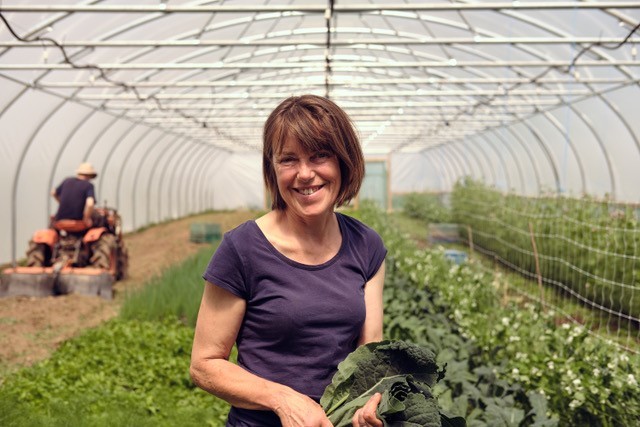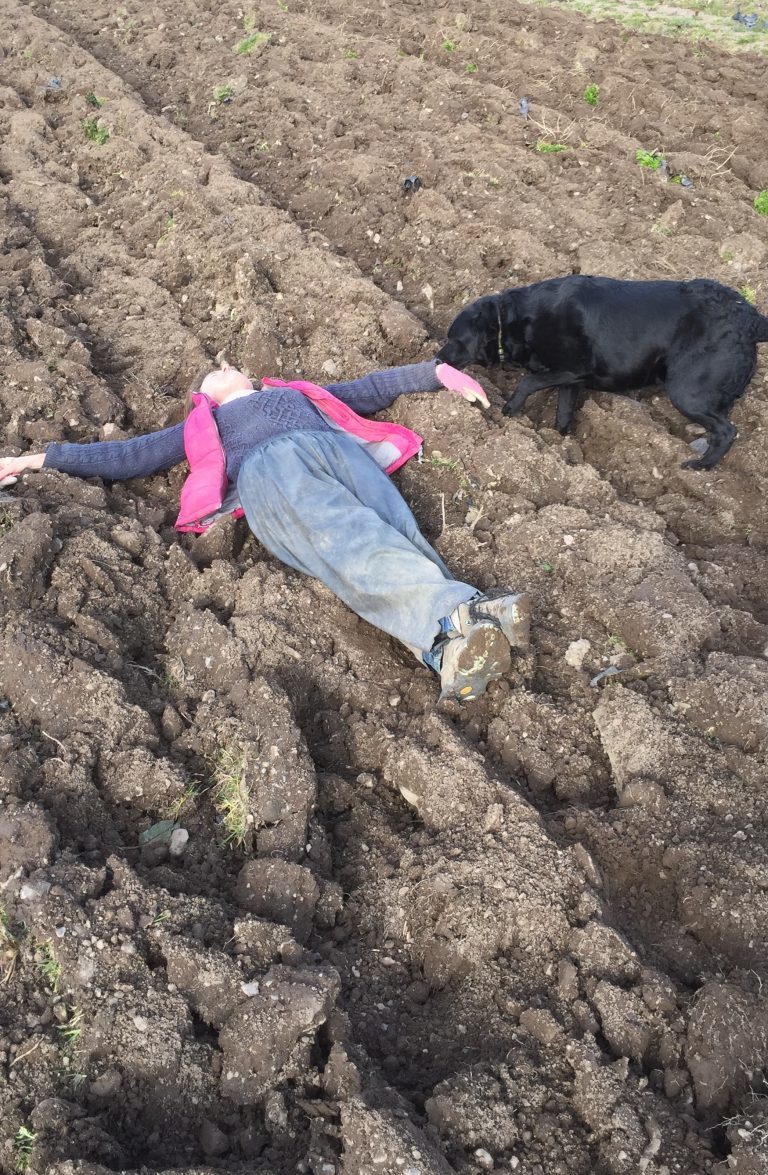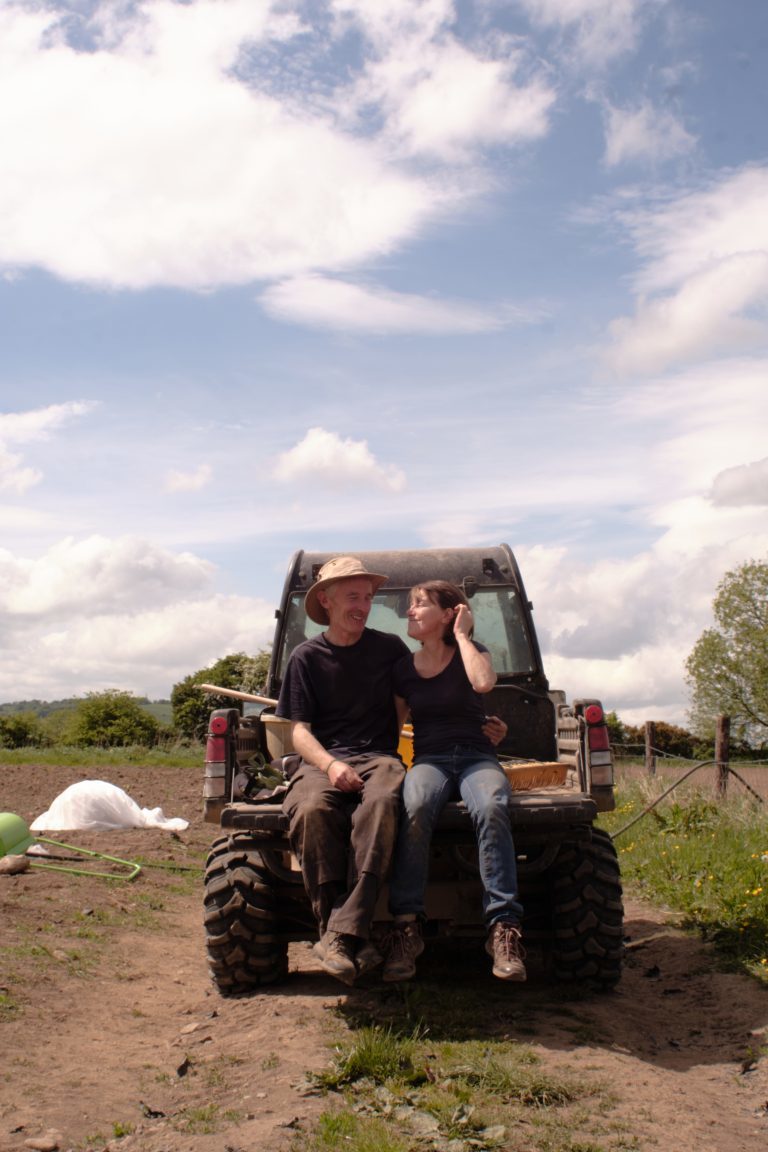Hilda Crampton, together with her husband Dominic Quinn, grow organically certified vegetables in the foothills of the Wicklow mountains.
Their farm is divided between hardwood forestry, vegetable production, polytunnels and a permanent grazing area. https://youtu.be/yuH0siuTnzE

Hilda Crampton
I love how each year brings a fresh beginning, a new adventure with the land. There are no boundaries outdoors just the big sky, the land and the connection with the infinite. Sowing seeds in trays for transplants has to be the best work. It is like a meditation, requiring fineness of attention. Sow in a little compost, add heat and water and a few days later the magic moment happens and the first baby leaves show themselves. It is such a celebration to witness all that stored potential appearing. They already know how to grow; all I do is care for them, plant them in fertile soil and keep the weeds at bay.
Humans – Connected with the Earth

The word human has its roots in ‘humus’ meaning soil or earth. Humus being the dark organic material in soil produced by the decomposition of vegetable or animal wastes and is essential to the fertility of the earth. The life and fate of soil and humans is and has always been intimately linked. We are connected to the earth, indeed made from the earth and will eventually return as food to the earth. Soils consume, digest, cycle and store nutrients that serve as the molecular building blocks for all forms of life. Soil stores more carbon than is contained in all above ground vegetation. When soils are healthy, societies are healthy. To quote Lady Eve Balfour founder of the Soil association and mother of the organic movement “The health of soil, plant, animal and man is one and indivisible” Health is the wholeness and integrity of living systems, characterised by physical, mental, social and ecological well-being.
Living soil is the basis of our food, water and climate and livelihood security. Modern man-made environments disconnect humans from the soil, and we can lose perspective of the fact that as living organisms we have evolved to function best within nature. Soil is the foundation from which our existence was built. We forget that all our food comes from the earth. Mahatma Gandhi reminded us: “To forget to dig the earth and tend the soil is to forget ourselves”. Gardening is one of the best ways of interacting with nature, to simply grow, cultivate and take care of plants. Organic gardening fundamentals require cultivation based on creating an ecosystem that nourishes and sustains soil microbes and plants while also benefiting insects and the environment. The essential principle is one of stewardship of the soil, managing it in a manner to ensure that the soil quality is retained and enhanced for future generations. Organic production combines elements of traditional knowledge with elements of modern ecological, social and agronomic science. Working with the soil using organic methods can be a service to the whole by restoring nature and re-creating vibrant local community and improve food security. Food insecurity is a global challenge that needs to be met with the development of sustainable food production systems and education.
Sowing Seeds

The freshest most nutritious food you can eat is simply the food produced when you have access to a garden filled with fruits and vegetables. The benefits are enormous. This all begins with the simple act of sowing seeds. Seeds contain everything necessary for the growth and development of a new plant. A pinch of seeds in the hands hold such promise. When a seed is sown it takes up moisture from the soil which automatically activates the development of roots and shoots. The fuel for growth comes from the food store within the seed. As soon as the leaves appear, seedlings need light to grow well. A gardener’s work is to provide the appropriate seasonal care for the plants to help them thrive. Knowing when to transplant, how much space to allow, when to weed or water and watching out for pests and disease are all part of the work. Good gardeners are patient and have the ability to adapt to whatever nature presents.
Slow Down

Working with the land creates a harmonious ecological niche to exist in and interact with the earth and serve our higher needs. It provides a harmonious space to relax, unwind, reflect and restore ourselves. It can serve as a place to appreciate the beauty, form and colours of nature, a place for observation, where we can watch nature and learn from it, reconnect with the cycles and rhythm of nature. When we spend time in the garden, we learn to slow down, forget our daily worries and concerns and immerse ourselves in that timeless moment of now.
Have a look at Hilda’s account on Instagram: https://www.instagram.com/casorgfarm/
